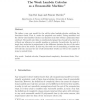Free Online Productivity Tools
i2Speak
i2Symbol
i2OCR
iTex2Img
iWeb2Print
iWeb2Shot
i2Type
iPdf2Split
iPdf2Merge
i2Bopomofo
i2Arabic
i2Style
i2Image
i2PDF
iLatex2Rtf
Sci2ools
104
click to vote
TCS
2008
2008
The weak lambda calculus as a reasonable machine
We define a new cost model for the call-by-value lambda-calculus satisfying the invariance thesis. That is, under the proposed cost model, Turing machines and the call-by-value lambda-calculus can simulate each other within a polynomial time overhead. The model only relies on combinatorial properties of usual beta-reduction, without any reference to a specific machine or evaluator. In particular, the cost of a single beta reduction is proportional to the difference between the size of the redex and the size of the reduct. In this way, the total cost of normalizing a lambda term will take into account the size of all intermediate results (as well as the number of steps to normal form). Key words: Lambda calculus, Computational complexity, Invariance thesis, Cost model
Related Content
| Added | 15 Dec 2010 |
| Updated | 15 Dec 2010 |
| Type | Journal |
| Year | 2008 |
| Where | TCS |
| Authors | Ugo Dal Lago, Simone Martini |
Comments (0)

